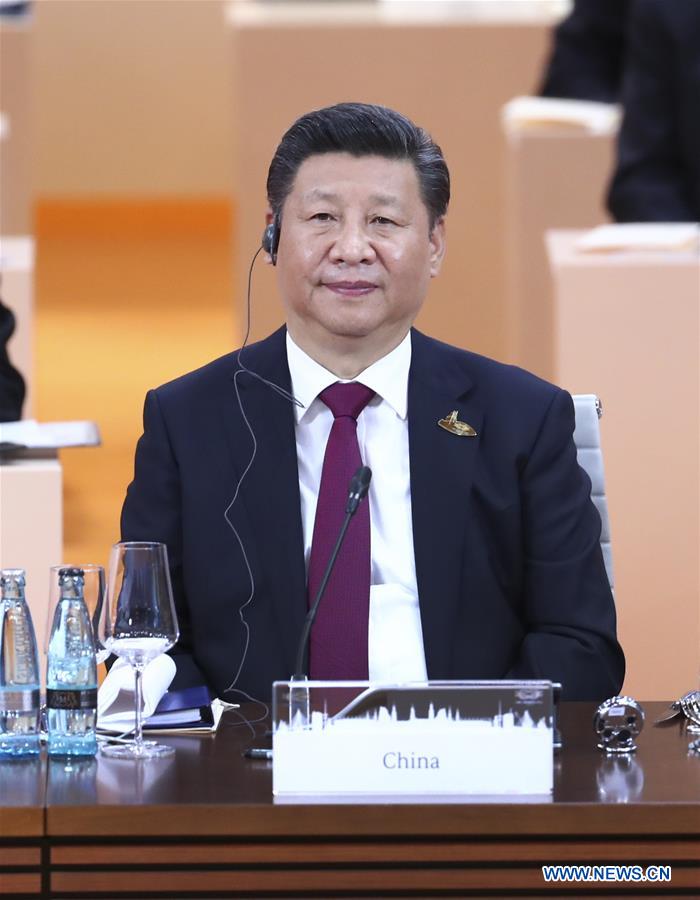Commentary: China pushes for "interconnected" growth at G20 summit
2017-07-11 10:20:36 来源: Xinhua 责任编辑: 兰楚文 Chinese President Xi Jinping attends the 12th Summit of the Group of 20 (G20) major economies in Hamburg, Germany, July 7, 2017. (Xinhua/Xie Huanchi) HAMBURG, Germany, July 11 (Xinhua) -- The just-concluded G20 summit sent a positive signal that the world's major economies, of which China is a bellwether, will push for "interconnected" growth, enhance economic cooperation and improve global governance. The Hamburg summit, themed "shaping an interconnected world," came as the global economy saw the best performance since the 2008 financial crisis. China's ideas and initiatives, voiced by President Xi Jinping in his speeches at the Hamburg summit and on a host of other international occasions since 2013, are deemed by many G20 members as a key force to lead global "interconnected" growth and advance shared prosperity. Standing at the height of building a community of shared destiny for mankind, President Xi raised in Hamburg a set of ideas on ensuring a strong, sustainable, balanced, and inclusive growth in accordance with the spirit of last year's Hangzhou summit. He noted that further action is needed as "the global economy is still plagued by deep-seated problems and faces many uncertainties and destabilizing factors." To build a more open world economy and realize a more inclusive global economic growth, Xi suggested that G20 support the multilateral trading regime and stay committed to openness and mutual benefit so as to increase the size of the global economic "pie." On boosting inclusiveness, the Chinese leader said G20 members need to promote synergy between economic and social policies, address the mismatch between industrial upgrading and knowledge and skills, and ensure more equitable income distribution. The Chinese president also stressed the need to improve global economic governance, urging the G20 members to strengthen macroeconomic policy coordination and forestall risks in financial markets. In the face of the new global economic environment, the communique of the Hamburg summit absorbed many of Xi's ideas and the consensuses reached at last year's Hangzhou summit. It's worth noting that compared with the previous year, the world economy shows positive signs but risks remain. The anti-globalization wave shows no sign of abating, trade protectionism and isolationism are picking up momentum, while the threat of terrorism is still widespread. The world is also facing a slew of common challenges such as displacement, poverty, hunger, health problems, unemployment, climate change, energy security and development imbalance, which undermine the stability and sustainability of the world economy. In an increasingly interconnected world, these challenges can no longer be managed by nations alone. China, as the second largest economy of the world, puts a premium on the credibility of its international commitment. Actions speak louder than words. China is actively delivering on its own commitments, translating political consensuses into a driving force for reform and development. A case in point is that China took the lead in addressing the steel overcapacity. With supply-side reform being implemented unswervingly, China's economic growth is on a stable track. The transformation and upgrading of China's economy will become a strong engine of the world economy. China is also actively promoting and implementing various political consensuses within the G20 framework. According to a research report, as of now, 80 percent of consensuses reached at the Hangzhou summit have been implemented, the second highest rate since G20's first summit in 2008. According to the G20 Hamburg Action Plan, China will take more measures to improve its business environment, promote investment facilitation, and reduce the burden on small and medium enterprises (SMEs). As Xi reiterated at the Hamburg summit, the concepts such as openness, cooperation, all-win results, joint consultation, joint construction and sharing advocated in the Belt and Road Initiative are compatible with the G20's partnership spirit, and that they are complementary to one another and can jointly boost world economic development. Proposed by Xi in 2013, the Belt and Road Initiative aims to build trade and infrastructure networks connecting Asia with Europe and Africa on and beyond the ancient Silk Road routes. It comprises the Silk Road Economic Belt and the 21st Century Maritime Silk Road. Standing on a new starting point, China will play a greater leading role in shaping an interconnected world. |



